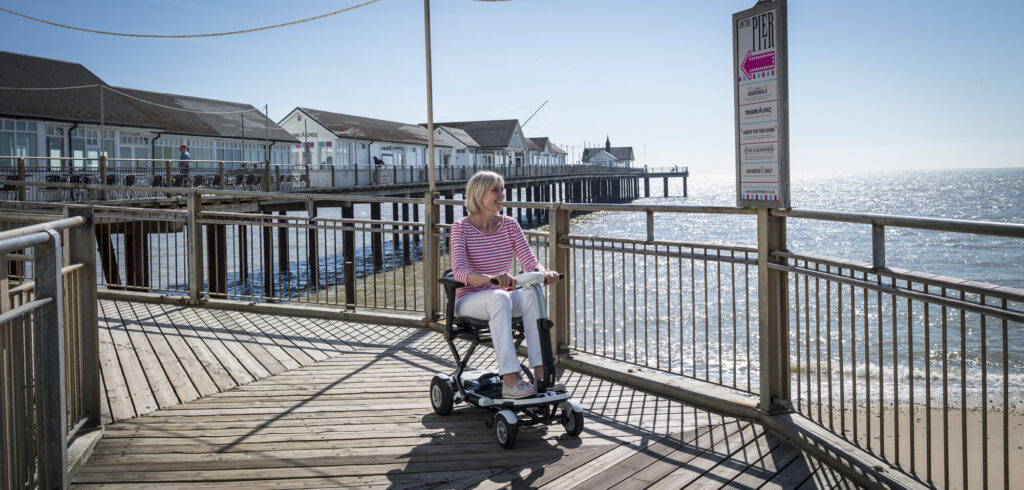Holiday with confidence
Our latest blog highlights tips on travel and how to maximise independence on arrival
With spring in full swing, we all tend to start thinking more about enjoying a summer holiday. It’s been a tough couple of years with many of us unable to travel or shielding at home. However, with Covid restrictions now eased, going away is more of a possibility. Travelling by car, coach, train or plane has become more inclusive; however, it’s always best to plan thoroughly before taking that trip.
If you need a manual or powered wheelchair to remain mobile, then you know it’s best to consider every aspect of your journey and how to benefit from hassle-free mobility on arrival. This blog highlights a few tips you might not be aware of…
Flying with a disability
If you are looking to take a flight, the team at Recare can offer you helpful guidance to ensure you can safely travel with your mobility product. For more information, get in touch with our team of experts – on 01993 880200 or message us here.
There will be many arrangements to consider, from accessible parking at the airport to transporting your wheelchair or scooter, boarding the plane, and enjoying freedom at your holiday destination. With plenty of time before your flight, contact your airline and departure and arrival airports to ensure they know you are coming and how best to assist you.
Planning and talking to your airline well in advance is vital. They have specialist support teams who can advise and arrange many aspects of your journey, including assistance at airports. It will be critical that you are familiar with the specification of your product, especially the type of batteries. If you are concerned about whether you need a flight certified battery for your product, contact our team with your product information, and we can advise you on flight certifications if they are available. Please get in touch with Recare well ahead of time.
The airline will likely advise you if they require specific information, so their ground crew and cabin personnel know how best to handle your wheelchair or powerchair. Labelling your product with its size and specification can make a massive difference. Each airline has different requirements for its flights. If you haven’t flown with them previously, make sure you have all the information available to make your outbound and inbound flights as easy as possible.

These are just a few of the considerations to think about. However, several support services are available with more information that can help with all aspects of flying, such as Tryb4uFly. Part of the QEF charity, Tryb4uFly is a unique service that provides all the answers to flying with a disability, including mock-up aeroplane cabins so you can experience boarding first-hand. QEF has also produced this excellent video on how to fly with a powerchair; watch it here.
Ideal travel-friendly product tip: Triride handbikes
Accessing public transport
If you prefer to travel by road or rail, there is lots of assistance to increase accessibility if you use a wheelchair or scooter. Researching beforehand is a must, and if it’s your first time, try and travel at quieter times, so you have more time and feel less pressurised.
Operators have special assistance advisors who can talk to you about stowing your product and embarking if you are taking a bus or coach. Some bus companies have mobility scooter passport schemes so you can travel in the knowledge your product meets their safety requirements. This is also true of rail operators such as Northern. The Northern Rail mobility scooter passport scheme is growing in popularity and offers information on accessible stations on the network and how to enjoy a day out; details here.

If driving to your holiday destination is not an option, charities such as Driving Mobility can also signpost you to lots of accessible transport options via their HUBs service. Supported by the Department for Transport, Driving Mobility co-ordinates over 20 driving assessment centres across the UK, which provide ‘fitness to drive’ assessments for clients sent by the DVLA, Motability, Police and NHS. If driving a car is deemed unsafe by their Occupational Therapists, you can remain mobile through their advice on accessing buses and trains and information on inclusive venues and destinations. More details on this new advice service can be found here.
Ideal travel-friendly product tip: Benoit wheelchair power add-ons
Going by car
When going on holiday by car, your chosen wheelchair or scooter needs to be compact and lightweight. You may need information on what wheelchairs are crash-tested if you are planning to travel whilst seated in your product. You might need a wheelchair that is easy to lift and manage in and out of the vehicle either on your own or with someone. Here at Recare, we can offer you our expert advice on the best travel-friendly products for your individual requirements. If you bring your car to our Oxfordshire showroom, we can even try a selection of products to see what’s best for storing in your vehicle. Alternatively, we can come and demonstrate at your home with a free no-obligation assessment. Our Assessors will be able to recommend a configurable wheelchair or powerchair that’s crash-test certified, hence safe for travel in a wheelchair accessible vehicle (WAV).
To make transporting a powerchair, wheelchair or scooter easier, many people choose extra equipment such as car boot hoists or rooftop boxes. Powered hoists will take all the strain away from lifting a scooter into the car such as those from our recommended supplier Autochair (or call 0800 009 2300). Specialist roof boxes that raise and store wheelchairs are also available.
When you arrive on holiday, having the right product for your needs makes all the difference. Before you go, think about where you will be visiting in the day, what the terrain is like, and then consider storage and charging. Powerchairs with batteries that can be charged offboard mean you can leave your product in the car for maximum convenience; however, if travelling abroad, always think about the voltage and whether you’ll need a converter.
More rural holidays involving countryside walks or trekking will mean you need an off-road product – with all-terrain suspension for comfort and extra performance. Equally, going on the beach safely means you’ll need a powerful piece of kit with the right kind of wheels.
As you can see, there is lots to consider but all easily solved by talking to us. Our friendly team have decades of travel advice and are committed to ensuring you have a happy holiday independently or with friends and family!
Ideal travel-friendly product tips: Freedom chair AO6 | Pride Revo 2.0
Make sure you’re covered
Holiday insurance
When going on any holiday whether its abroad or a staycation, we always recommend you have insurance. Even if you can’t get away just yet but are looking to purchase a new product, or have a product currently, it important to cover yourself. The right insurance policy will protect you, your product and members of the public.
Extending your product warranty
It can also be hugely beneficial to extend the warranty period on your product. You always receive a standard manufacturer’s warranty however it is wise to extend this with an extra policy so you are covered for longer. We only supply quality, reliable products however for extra peace of mind, then we always recommend this option.
If you have just purchased a product or owned one for a while, get in touch with our team and we will offer expert advice on insurance and warranties through our specialist provider Mark Bates Ltd.
Ideal travel-friendly product tips: TGA Powerpack
For the latest travel advice and the most appropriate products, call us on 01993 880200 or message us here.
![Recare [logo]](https://www.recare.co.uk/wp-content/themes/recare-theme-2021/assets/img/recare-logo-no-strap.svg)
